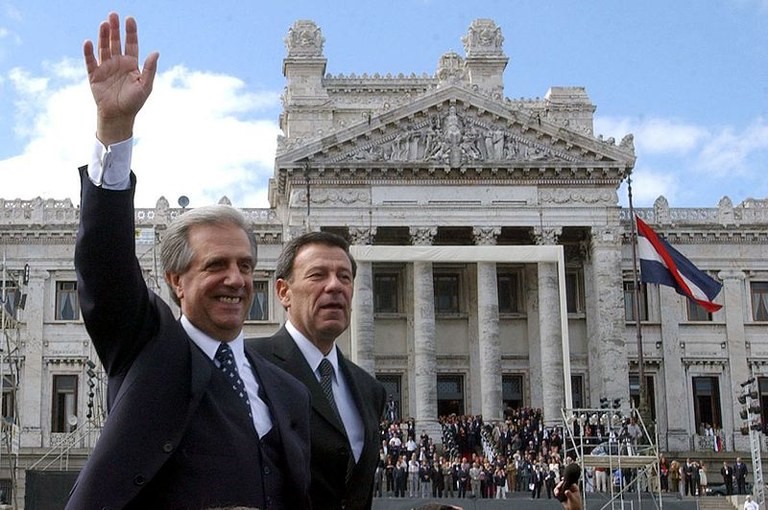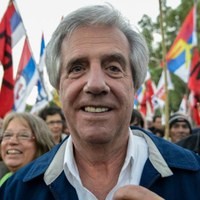Montevideo (Uruguay), 1940
By Gerardo Caetano Hargain
An Enigmatic Leader of a Different Kind
Possessing a leadership style that is completely different from traditional ones, even on the left, Tabaré Vázquez is an enigmatic figure for many, particularly regarding his communication skills and the strength of his charisma with the country’s popular classes. He has secured his place in Uruguayan history as the first elected mayor of the capital from a leftist party (1989) and, in 2004, as the first president of the Republic from these ideological trends after 175 years of governance by traditional parties, interspersed with brief periods of civic-military authoritarianism.
Born in the working-class neighborhood of La Teja in Montevideo, he is the son of Elena Rosas and Héctor Vázquez (a frigorific worker who later became an employee and unionist of ANCAP, one of the most important public companies in Uruguay). Tabaré Vázquez likes to publicly recall the humility of his origins. “Our mother,” he recounted to journalist Néstor Fernández in an interview for La Nación on May 2, 2004, “bathed us in a tub before we went out to play in the street because we were poor, but clean. And our father eagerly awaited his annual vacation… Do you know why? To paint the house and make it beautiful.”
Tabaré pursued a career in medicine, graduating in December 1969. However, it was after a family tragedy that he defined his subsequent steps: his father, mother, and a sister died of cancer between 1962 and 1968. This undoubtedly influenced his choice to specialize in oncology (specifically, radiotherapy), which he completed in 1972. Following a period of further training in France, he became a full professor at the former Faculty of Medicine of the University of the Republic at the age of 45.
In addition to his passion for medicine, he had other popular interests, including the Arbolito club in La Teja, which he co-founded, and the Progresso soccer club from the same neighborhood. He served as president of the club and saw it win championships in both the second and first divisions of professional soccer (he had a notable career in soccer: in 1987, he was part of the Finance Committee of the Uruguayan Football Association (AUF), and the following year was nominated several times for its presidency, although he was blocked by leaders of major teams, specifically Peñarol, for clear political reasons). In addition to various social projects at the club and in the neighborhood (such as a children’s dining room and a polyclinic), he donated land for the construction of the Progresso team’s training facilities. None of these passions, however, nor even his political passion, were able to overshadow his vocation and medical work. “When he analyzes a political problem,” said Álvaro, one of his sons, “he approaches it as a doctor. He studies it, makes a diagnosis, and then decides on the treatment. The Emergency Plan of the Frente Amplia is like a medical treatment.”
Socialist Activist
His activism in the Socialist Party was also linked to his medical profession, as he participated in several Health Commissions of the party and, in 1978, during the dictatorship, in the so-called Socialist Medical Networks. In 1986, he was elected a member of the Central Committee of the Socialist Party. His most notable political career began when Mariano Arana, who had been a candidate for the mayoralty of Montevideo for the Frente Amplia (FA) in 1984, decided to withdraw his candidacy in 1989 and focus on sectoral political work as a senator for what would become the Artiguista Front. Arana proposed Vázquez as the candidate to fill the vacant position, presenting him as an “oncologist and sports leader of exceptional performance,” who had also been responsible for the finances of the Commission for the Green Vote, created to annul the Law of Expiry through a referendum (which ultimately took place in April 1989, resulting in a negative outcome). In the November 1989 elections, with the Frente Amplia divided (the Nuevo Espacio, led by Hugo Batalla, had been formed), Vázquez comfortably won Montevideo with 34.5% of the votes. That same year, he also saw his beloved Progresso crowned Uruguayan champion.
While serving in the municipal government of Montevideo—without abandoning his medical profession, teaching, or business life—he took steps to establish, along with the Frente Amplia, the Encuentro Progresista, incorporating external forces into the already traditional left coalition. This would lead him to run for the presidency in the 1994 elections. At that time, the Colorado Party received 32.39% of the votes, the National Party 31.21%, and the Encuentro Progresista 30.61%. In 1999, winning the left’s internal election over the other candidate, Danilo Astori, he returned to the polls. Due to new electoral rules (a second round and other modifications approved in the 1996 constitutional reform), he was defeated again, this time by Jorge Batlle in the second round (52.26% of the votes against 44.53%).
Victory in 2004
At the beginning of Batlle’s administration, the unexpected closeness and dialogue between the president and Vázquez proved crucial for advancing initiatives such as the Commission for Peace, aimed at clarifying what happened to the missing prisoners during the dictatorship. During the challenging moments of 2002, despite his role as opposition, he ensured a firm institutional loyalty when, behind the scenes, movements were underway to remove the president, and in the Encuentro Progresista, minority sectors were advocating for early elections. Thus, he entered the 2004 elections as the favorite, winning in the first round with 50.7% of the votes. This was a resounding victory, realizing what had been considered by traditional parties in 1996 as the perfect dam to prevent a leftist victory: the perception that no party could achieve more than half of the total votes cast. In this spectacular growth of the Encuentro Progresista, which led it to capture over 20% of the electorate in just a decade, Vázquez’s role was decisive.
Despite being accused of being an outsider, Tabaré Vázquez demonstrated that he was a party man who, nonetheless, navigated well outside of party structures. He is a calm, simple speaker, using medical or “scientific” metaphors, persuasive and engaging. His leadership is very distinct from that of his predecessor as president of the Frente Amplia, General Líber Seregni. He does not seem very comfortable competing publicly with leaders of other parties. In contrast, he feels “at home” in direct communication with people, managing to earn applause from his occasional audience. Often unpredictable, he struggled to generate trust in the political negotiation field with his adversaries, but their criticisms seemed to enhance his popularity and galvanize his decision-making capacity. As president, he proved to be pragmatic, moderate, and at the same time firm in his transformative vocation, just as he was during the electoral campaign. With the firm support he gave to his former rival on the left, now his government’s Minister of Economy, Danilo Astori, he appears to frame his administration in a way that aligns much more closely with those of Lula and Lagos than with Venezuelan leadership. In any case, he began to implement several of the promised changes (concrete and relevant advances in clarifying human rights violations during the dictatorship, reinstating collective bargaining between employers and workers, profound shifts in foreign policy, implementing an emergency plan against indigence, etc.), although he was careful to reiterate that his promise was for “changes,” but “without miracles.” In 2010, he left the presidency with 80% public approval. On November 30, 2014, he was elected for another presidential term with 53% of the votes.




